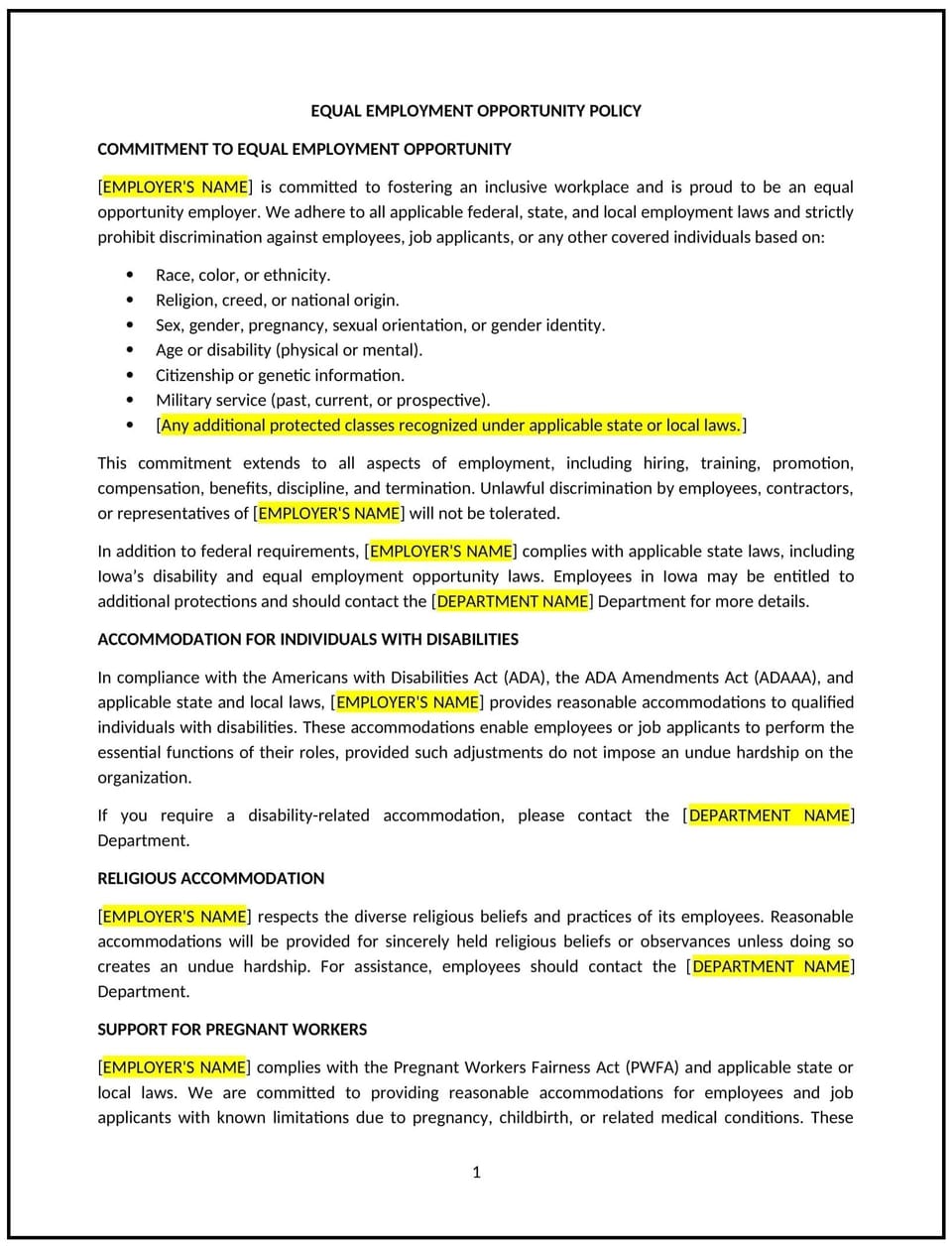Equal employment opportunity policy (Iowa): Free template

Equal employment opportunity policy (Iowa)
An equal employment opportunity (EEO) policy helps Iowa businesses create a fair and inclusive workplace by promoting hiring, promotions, and workplace decisions based on qualifications rather than personal characteristics. A strong EEO framework enhances workplace diversity, improves employee morale, and strengthens business reputation.
This policy outlines hiring and employment practices, anti-discrimination principles, and expectations for fostering an equitable work environment. It provides businesses with a structured approach to ensuring fair treatment of all employees and job applicants.
By implementing this policy, businesses in Iowa can support workplace inclusivity, reduce hiring biases, and create a culture of respect and equal opportunity.
How to use this equal employment opportunity policy (Iowa)
- Define EEO principles: Establish a commitment to fair hiring, promotions, and workplace decisions based on merit.
- Prohibit discrimination: Outline that hiring, pay, benefits, and promotions should be based on qualifications, not race, gender, age, disability, religion, or other protected factors.
- Encourage inclusive hiring: Develop recruitment strategies that attract diverse talent.
- Address workplace accommodations: Offer reasonable adjustments to support employees with disabilities or religious needs.
- Promote anti-harassment policies: Maintain a respectful workplace where all employees feel valued and heard.
- Implement fair performance evaluations: Use objective criteria for promotions, raises, and disciplinary actions.
- Establish reporting procedures: Provide employees with a clear process for raising concerns about discrimination or unfair treatment.
- Review and update: Regularly assess hiring practices and workplace policies to reflect evolving business needs and workforce diversity.
Benefits of using this equal employment opportunity policy (Iowa)
This policy offers several advantages for Iowa businesses:
- Strengthens workplace diversity: Encourages hiring practices that reflect a broad range of perspectives and backgrounds.
- Reduces bias in hiring and promotions: Creates a structured approach to evaluating job candidates based on skills and experience.
- Enhances company reputation: Demonstrates a commitment to fairness and equal opportunity.
- Improves employee morale: Fosters an inclusive work environment where all employees feel valued.
- Supports business growth: Expands the talent pool by attracting highly qualified candidates from diverse backgrounds.
- Promotes ethical workplace practices: Encourages transparency and accountability in employment decisions.
Tips for using this equal employment opportunity policy (Iowa)
- Standardize hiring practices: Businesses should use structured interview and selection criteria to ensure fair evaluations.
- Train managers on EEO principles: Businesses should educate supervisors on inclusive hiring and workplace decision-making.
- Encourage diverse recruitment: Businesses should expand job postings to reach underrepresented talent pools.
- Provide a clear reporting process: Businesses should establish confidential channels for employees to report discrimination concerns.
- Recognize inclusive leadership: Businesses should encourage managers to support diversity and foster an equitable workplace.
- Monitor and improve policies: Businesses should periodically assess hiring and promotion trends to maintain fair employment practices.
Q: Why should Iowa businesses implement an equal employment opportunity policy?
A: Businesses should adopt this policy to promote fair hiring practices, support workplace diversity, and create a culture of inclusion.
Q: How can businesses promote equal opportunity in hiring?
A: Businesses should use structured hiring criteria, expand recruitment outreach, and focus on evaluating candidates based on skills and experience.
Q: What should businesses do if an employee reports discrimination?
A: Businesses should take complaints seriously, investigate promptly, and apply corrective actions when necessary.
Q: How can businesses create a more inclusive work environment?
A: Businesses should provide diversity training, encourage employee resource groups, and foster open discussions on workplace inclusivity.
Q: Can businesses consider diversity in hiring decisions?
A: Businesses should focus on hiring based on merit while actively creating opportunities for underrepresented candidates.
Q: How should businesses handle requests for workplace accommodations?
A: Businesses should assess accommodation requests on a case-by-case basis and provide reasonable adjustments where feasible.
Q: How often should businesses review their equal employment opportunity policy?
A: Businesses should reassess the policy annually to reflect workplace changes and workforce diversity goals.
Q: What role do managers play in enforcing EEO policies?
A: Businesses should expect managers to uphold fair employment practices, prevent discrimination, and address concerns professionally.
This article contains general legal information and does not contain legal advice. Cobrief is not a law firm or a substitute for an attorney or law firm. The law is complex and changes often. For legal advice, please ask a lawyer.


